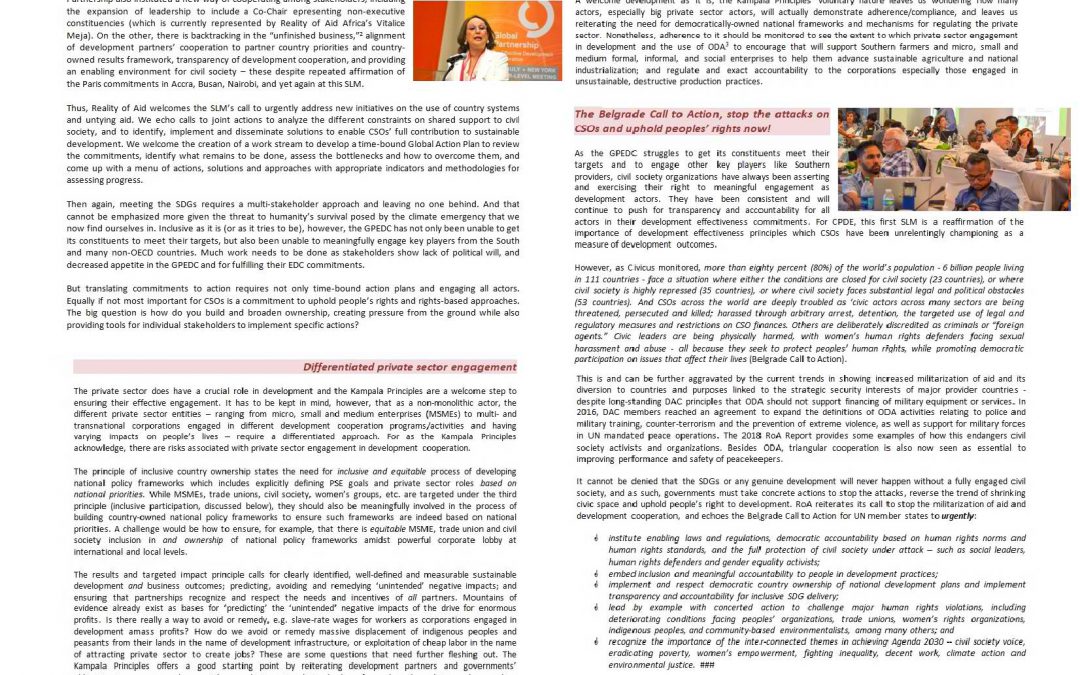On the one hand, there is significant progress in terms of quality, inclusivity and use of SDGs in developing country and development partners’ planning. The Global Partnership also instituted a new way of cooperating among stakeholders, including the expansion of leadership to include a Co-Chair representing non-executive constituencies (which is currently represented by Reality of Aid Africa’s Vitalice Meja). On the other, there is backtracking in the “unfinished business,”2 alignment of development partners’ cooperation to partner country priorities and countryowned results framework, transparency of development cooperation, and providing an enabling environment for civil society – these despite repeated affirmation of the Paris commitments in Accra, Busan, Nairobi, and yet again at this SLM.
Thus, Reality of Aid welcomes the SLM’s call to urgently address new initiatives on the use of country systems and untying aid. We echo calls to joint actions to analyze the different constraints on shared support to civil society, and to identify, implement and disseminate solutions to enable CSOs’ full contribution to sustainable development. We welcome the creation of a work stream to develop a time-bound Global Action Plan to review the commitments, identify what remains to be done, assess the bottlenecks and how to overcome them, andcome up with a menu of actions, solutions and approaches with appropriate indicators and methodologies for assessing progress.
Then again, meeting the SDGs requires a multi-stakeholder approach and leaving no one behind. And that cannot be emphasized more given the threat to humanity’s survival posed by the climate emergency that we now find ourselves in. Inclusive as it is (or as it tries to be), however, the GPEDC has not only been unable to get its constituents to meet their targets, but also been unable to meaningfully engage key players from the South and many non-OECD countries. Much work needs to be done as stakeholders show lack of political will, and decreased appetite in the GPEDC and for fulfilling their EDC commitments. But translating commitments to action requires not only time-bound action plans and engaging all actors. Equally if not most important for CSOs is a commitment to uphold people’s rights and rights-based approaches. The big question is how do you build and broaden ownership, creating pressure from the ground while also providing tools for individual stakeholders to implement specific actions?
1 GPEDC brings together traditional providers, developing country partners, CSOs, parliamentarians, foundations and business associations around a broad agenda for effective development cooperation (EDC) – the main purpose and core objective of which is to improve development results at country level. At the 2011 Busan High Level Forum, it adopted four key principles to guide the reform of their development cooperation practices understood to be consistent with international commitments on human rights, decent work, gender equality, environmental sustainability, and disability: (i) country ownership of development priorities by partner developing countries; (ii) focus on results, aligned with the priorities and policies set out by developing countries themselves; (iii) inclusive development partnerships; and (iv) transparency and mutual accountability. These principles and stakeholder commitments were aligned towards the achievement of the 2030 Agenda at the GPEDC High-Level Meeting in Nairobi in 2016. The GPEDC was charged with the responsibility to monitor progress in implementing these principles.
2 Refers to unfinished development effectiveness commitments of various development actors as embodied in the abovementioned four “Busan Principles”
DOWNLOAD: Key to Effective Development Cooperation

